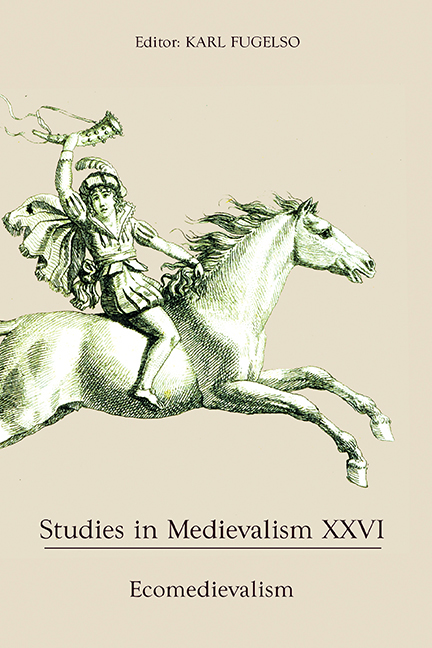Book contents
- Frontmatter
- Studies in Medievalism
- Acknowledgments
- Contents
- List of Illustrations
- Editorial Note
- I Ecomedievalism: Some Perspective(s)
- “A Sense of Life in Things Inert”: The Animistic Figurations in Nineteenth- and Twentieth-Century Medievalist Texts
- Future Nostalgias: Environmental Medievalism and Lanier's Southern Chivalry
- T. H. White's “Forest Sauvage”: Nostalgia and Loss
- Elvencentrism: The Green Medievalism of Tolkien's Elven Realms
- II Interpretations
- Contributors
- Miscellaneous Endmatter
Elvencentrism: The Green Medievalism of Tolkien's Elven Realms
from I - Ecomedievalism: Some Perspective(s)
Published online by Cambridge University Press: 15 September 2017
- Frontmatter
- Studies in Medievalism
- Acknowledgments
- Contents
- List of Illustrations
- Editorial Note
- I Ecomedievalism: Some Perspective(s)
- “A Sense of Life in Things Inert”: The Animistic Figurations in Nineteenth- and Twentieth-Century Medievalist Texts
- Future Nostalgias: Environmental Medievalism and Lanier's Southern Chivalry
- T. H. White's “Forest Sauvage”: Nostalgia and Loss
- Elvencentrism: The Green Medievalism of Tolkien's Elven Realms
- II Interpretations
- Contributors
- Miscellaneous Endmatter
Summary
In 1972 the eco-activist David Taggart sailed into a French nuclear testing site, in what many consider to be the foundational protest of Greenpeace. Taggart later wrote of the experience, “I had been reading The Lord of the Rings. I could not avoid thinking of parallels between our own little fellowship and the long journey of the Hobbits into the volcano-haunted land of Mordor.” It is not surprising that a medieval-inspired story of different people coming together to save their world resonated with the Greenpeace movement. Tolkien, in his work, often emphasizes the struggle to overcome adversity; however, he also gives ample attention to the importance of nature – a perfect combination for environmentalists. Accordingly, Verlyn Flieger states, “Tolkien has come more and more to be viewed as a kind of advanceman for the Green Movement.” Indeed, Tolkien was a staunch supporter of nature and exhibited this through his work, as he explains in a letter to the editor of the Daily Telegraph: “In all my works I take the part of trees as against all their enemies.” Additionally, he was clear about his reaction to mishandled nature. “I am (obviously) much in love with plants and above all trees, and always have been,” he wrote in a letter to his publisher, “and I find human maltreatment of them as hard to bear as some find ill-treatment of animals.” Tolkien's strong sentiments about the value of nature clearly echo throughout his writings, where the landscape is as important to the story as any of the main characters.
As a fantasy author, Tolkien wrote of an epic journey; as a medievalist, he situated this journey on a medieval landscape. Always vast and occasionally war-torn, the landscape of Tolkien's mythopoeic world includes, in the Elven realms, an idealized green space that echoes the royal parks of the Middle Ages. In Middle-earth's saga, I argue, this medieval-inspired idealized green space becomes ecocentric. Furthermore, the philosophical foundation of Tolkien's nature is evocative of what later is known as “deep ecology”, particularly as it pertains to the Eldar Elves.
- Type
- Chapter
- Information
- Studies in Medievalism XXVIEcomedievalism, pp. 31 - 42Publisher: Boydell & BrewerPrint publication year: 2017

